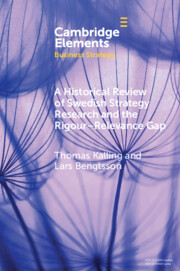We use the parable of the blind men and the elephant to suggest that Barney and Zhang (2009) and Whetten (2009) analogously touch on only a part of the Chinese management research puzzle. Their analyses remind us of many attempts at anchoring the research purpose – etic versus emic approaches, exploration versus exploitation approaches, rigor versus relevance scenarios – touched on by the many commentators in this issue. We suggest researchers first answer the ‘purpose’ questions before embarking on the research design. The research design should fit the purpose of the knowledge, which is either to improve the performance of Chinese organizations (meeting the relevance criterion) or to replicate, extend or refine a theory developed in the US (meeting the rigour criterion). We believe the strength of applied management research allows us to create knowledge that can meet the criteria of both rigour and relevance. We support the use of academic international research teams and dialectic debate as tools to move the field of Chinese management research forward.


